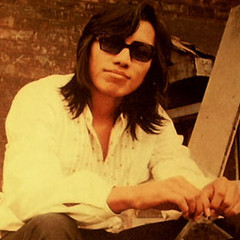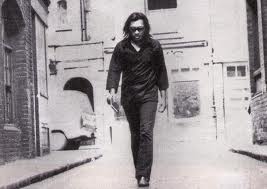 Take a moment to think of the greatest, era-defining recording artists or acts you’ve ever heard of, especially those who’ve had a major impact on society, culture, your own life; acts you grew up with. Bob Dylan? Jimi Hendrix? The Beatles, the Stones (the Rolling Who)? Joni Mitchell? Madonna? Elvis? Take your pick.
Take a moment to think of the greatest, era-defining recording artists or acts you’ve ever heard of, especially those who’ve had a major impact on society, culture, your own life; acts you grew up with. Bob Dylan? Jimi Hendrix? The Beatles, the Stones (the Rolling Who)? Joni Mitchell? Madonna? Elvis? Take your pick.
Now imagine that, having spent your whole life so pervasively aware of them that they are an indelible part of the fabric of your experience, you take a trip to a not-very-foreign country, only to discover that no one you meet on your travels has ever heard of them. Imagine hanging out with like-minded friends in New York, say, who have never heard of the Beatles – not just that they are unfamiliar with the band’s more obscure work, or can name only a couple of major hits, but that they have literally no idea who you are talking about.
As a South African from a liberal, politically aware, middle-class white family (much of it into the protest music of the 60s, of course), I grew up listening to the artists listed above, along with the likes of Donovan, Joan Baez, Pink Floyd and others. Them, and a massively famous (or so I thought) American folk rocker called Rodriguez. While on a gap year in London at the age of 19, I got to chatting one late, boozy night at a party with a bunch of musos and music fans much like me, naming the truly classic albums which everyone should be forced to own upon pain of death. Led Zep IV, Sergeant Pepper, Bridge Over Troubled Water (the title track notwithstanding, of course), Court and Spark, Blood on the Tracks, Ziggy Stardust, Jagged Little Pill, The Bends and so on. Barring the odd scuffle (is Pet Sounds really that big a deal? Is Abbey Road perhaps the better collection than “concept” album Pepper? Is The Wall a work of genius or an overrated exercise in pretension? And what about Janis Joplin and Tom Waits?), for the most part there was agreement. Until I enthusiastically offered Rodriguez’s opus Cold Fact and was met with utterly blank faces.
 “What do you mean, ‘Who’s Rodriguez’?” I demanded. Which is exactly what Stephen Segerman, a record shop owner, and Craig Bartholemew, a journalist, had wanted to know when the same thing happened to them. That’s like asking “Roy Orbi-whatnow?”
“What do you mean, ‘Who’s Rodriguez’?” I demanded. Which is exactly what Stephen Segerman, a record shop owner, and Craig Bartholemew, a journalist, had wanted to know when the same thing happened to them. That’s like asking “Roy Orbi-whatnow?”
Legend had it that Rodriguez had been one of the most bizarre rock suicides in history – shooting himself on stage, setting himself on fire as an encore, another one in the litany of famous overdosers – but in truth no one actually knew what had happened to him. So Stephen and Craig went looking – and what they found was the kind of story you couldn’t make up.
In the late 60s a Mexican-American musician was discovered in a Detroit bar, playing with his back to the audience. The two producers who found him had recorded with Marvin Gaye, Stevie Wonder and other great men, and they believed that here they had found someone just as extraordinary, a sort of Chicano Bob Dylan. Rodriguez’s lyrics were poetic, angry and beautiful, his voice haunting and his music infectious. With him they recorded an album – Cold Fact – which despite good reviews sank like the proverbial stone…
Until someone (history does not record who) took a copy to South Africa, where through grapevines and bootlegging it found a legion of fans among the disaffected liberals, for whom it became a veritable soundtrack. From the laid-back strains of “Sugar Man” (the dope-smoking song for every rebellious South African teenager since 1970 to this day) to the sad frustration of “This is Not a Song, it’s an Outburst, or the Establishment Blues” to the melancholy loveliness of “Forget It” via the compulsively anthemic “I Wonder”, it is a cracker of an album with nary a dud track – an album no self-respecting South African music fan would be without. For over 40 years it has been a persistent classic.
 Yet when they finally tracked down Rodriguez, the equal of Bob Dylan for any South African in terms of prominence and significance was very much alive – and entirely unaware of his fame on the other side of the world. When the album flopped, he had given up his dreams of being a musician and gone quietly and without bitterness back to his day job as a construction worker in Detroit. He had never seen a penny of royalties, nor been told that Cold Fact was a gold record many times over.
Yet when they finally tracked down Rodriguez, the equal of Bob Dylan for any South African in terms of prominence and significance was very much alive – and entirely unaware of his fame on the other side of the world. When the album flopped, he had given up his dreams of being a musician and gone quietly and without bitterness back to his day job as a construction worker in Detroit. He had never seen a penny of royalties, nor been told that Cold Fact was a gold record many times over.
The story of the search for Rodriguez came to the attention of a Swedish filmmaker, Malik Bendjelloul, who fell in love with the story. For several years he worked on it, first tracking down Rodriguez himself for interviews and then following him through the 30-years-delayed experience of being the rock god he never knew he was. Despite all his hard work, he was unable to find funding and the film very nearly didn’t happen. Thanks to the timely intervention of producer Simon Chinn and executive producer John Battsek, the film was completed and made it to Robert Redford’s Sundance Film Festival, where it met with great acclaim.
 Rodriguez has since toured South Africa no fewer than four times, playing to sold-out crowds in huge venues and is finally recouping some of the pretty impressive fortune his music has earned over the decades. He still lives his meagre existence in Michigan, however, and has given much of the money away. Were this not a true story, no one would believe it. And it makes one heck of a movie.
Rodriguez has since toured South Africa no fewer than four times, playing to sold-out crowds in huge venues and is finally recouping some of the pretty impressive fortune his music has earned over the decades. He still lives his meagre existence in Michigan, however, and has given much of the money away. Were this not a true story, no one would believe it. And it makes one heck of a movie.
Searching for Sugar Man is released in the UK on 27 July. In the interim, check out our interview with Stephen Segerman or read the review.




